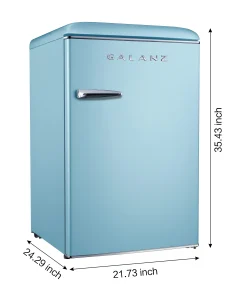Updated on March 13, 2023
If you’re relocating or shopping for new appliances, you may be wondering if there are any special considerations to keep in mind.
Between 100 to 400 pounds, the average weight of a full-size refrigerator in a residential home is 250 pounds. As a general rule of thumb, French door refrigerators weigh 317 pounds, side by side refrigerators 285 pounds, Top Freezer refrigerators 166.6 lbs, Bottom Freezer refrigerators 220 lbs, and Mini fridges weigh 60 lbs on average. Refrigerators weigh around 12 pounds per cubic foot of capacity.

So, for example, a Samsung French Door refrigerator with a size of 28 cubic feet weighs around 336 pounds.
In order to better understand how much refrigerators weigh, we’ll go into further detail here:
Here are the weights of 58 popular refrigerators from various brands, styles, and sizes that you may be interested in purchasing.
Tips for moving refrigerators without hurting yourself or your home are also included in this guide.
| Brand | Type | Weight (lbs) | Weight (kg) | Capacity (cu.ft.) | Pounds per Cubic Foot of Capacity |
|---|
| GE | Bottom Freezer | 253 | 115 | 24.8 | 10 |
| GE | Bottom Freezer | 210 | 95 | 21 | 10 |
| GE | Bottom Freezer | 176 | 80 | 11.9 | 15 |
| Haier | Bottom Freezer | 174 | 79 | 15 | 12 |
| LG | Bottom Freezer | 226 | 103 | 25.5 | 9 |
| LG | Bottom Freezer | 168 | 76 | 14.7 | 11 |
| Unique | Bottom Freezer | 119 | 54 | 21.6 | 6 |
| Whirlpool | Bottom Freezer | 280 | 127 | 18.7 | 15 |
| Whirlpool | Bottom Freezer | 252 | 114 | 22 | 11 |
| Amana | Bottom Freezer | 288 | 131 | 18.6 | 15 |
| Bosch | French Door | 350 | 159 | 20.5 | 17 |
| GE | French Door | 390 | 177 | 28 | 14 |
| GE | French Door | 370 | 168 | 27.7 | 13 |
| GE | French Door | 360 | 163 | 22.1 | 16 |
| GE | French Door | 308 | 140 | 27 | 11 |
| KitchenAid | French Door | 350 | 159 | 20 | 18 |
| LG | French Door | 334 | 151 | 26 | 13 |
| LG | French Door | 322 | 146 | 27.8 | 12 |
| LG | French Door | 259 | 117 | 22.8 | 11 |
| RCA | French Door | 271 | 123 | 22 | 12 |
| Samsung | French Door | 328 | 149 | 28 | 12 |
| Samsung | French Door | 311 | 141 | 28 | 11 |
| Samsung | French Door | 251 | 114 | 21.8 | 12 |
| Samsung | French Door | 232 | 105 | 17.5 | 13 |
| Whirlpool | French Door | 320 | 145 | 25 | 13 |
| Bull Outdoor Products | Mini Fridge | 51 | 23 | 4.4 | 12 |
| Galanz | Mini Fridge | 99 | 45 | 7.6 | 13 |
| Galanz | Mini Fridge | 22 | 10 | 7.6 | 3 |
| GE | Mini Fridge | 77 | 35 | 5.6 | 14 |
| Kuppet | Mini Fridge | 40 | 18 | 3.2 | 13 |
| Magic Chef | Mini Fridge | 64 | 29 | 4.5 | 14 |
| Magic Chef | Mini Fridge | 59.5 | 27 | 4.4 | 14 |
| Magic Chef | Mini Fridge | 56 | 25 | 3.1 | 18 |
| Magic Chef | Mini Fridge | 50 | 23 | 3.3 | 15 |
| Magic Chef | Mini Fridge | 42 | 19 | 2.6 | 16 |
| Magic Chef | Mini Fridge | 95 | 43 | 7.5 | 13 |
| Frigidaire | Side by Side | 293 | 133 | 25.6 | 11 |
| GE | Side by Side | 340 | 154 | 21.8 | 16 |
| GE | Side by Side | 320 | 145 | 25.3 | 13 |
| LG | Side by Side | 304 | 138 | 26 | 12 |
| Samsung | Side by Side | 289 | 131 | 27.4 | 11 |
| Whirlpool | Side by Side | 283 | 128 | 28.5 | 10 |
| Whirlpool | Side by Side | 262 | 119 | 24.55 | 11 |
| Whirlpool | Side by Side | 242 | 110 | 21.4 | 11 |
| Whirlpool | Side by Side | 242 | 110 | 20.6 | 12 |
| Insignia | Side by Side | 276 | 125 | 26.3 | 10 |
| Frigidaire | Top Freezer | 220 | 100 | 20.4 | 11 |
| Frigidaire | Top Freezer | 205 | 93 | 18 | 11 |
| Frigidaire | Top Freezer | 164 | 74 | 18.3 | 9 |
| Frigidaire | Top Freezer | 138 | 63 | 13.9 | 10 |
| Frigidaire | Top Freezer | 135 | 61 | 13.9 | 10 |
| GE | Top Freezer | 202 | 92 | 21.9 | 9 |
| GE | Top Freezer | 152 | 69 | 16.6 | 9 |
| Insignia | Top Freezer | 165 | 75 | 18.1 | 9 |
| Insignia | Top Freezer | 117 | 53 | 10.5 | 11 |
| Magic Chef | Top Freezer | 117 | 53 | 10.1 | 12 |
| Whirlpool | Top Freezer | 209 | 95 | 20 | 10 |
| Whirlpool | Top Freezer | 173 | 78 | 18 | 10 |
Weight in Context
The weight of a simple number, such as 300 or 400 pounds, is both weighty and ethereal at the same time. Is a refrigerator that weighs 300 pounds too heavy to move?
In order to offer you some context, let’s compare the weight of the refrigerator to that of other heavy objects.
Tiny mattresses, or two small mattresses placed on top of each other, can fit in most freezers. Think about the weight of two twin mattresses placed on top of each other, which normally weighs between 45 and 60 pounds.
It’s crucial to keep in mind how heavy the refrigerator is. The refrigerator, on the other hand, is cumbersome and awkward compared to deadlifting or bench pressing 300 pounds. Rather than being a tool for moving and lifting, it’s designed to keep your food cold and safe.
Choosing the Right Refrigerator Size to Reduce Weight and Cost
You don’t want to purchase more refrigerator than you need since they are heavy and pricey.
On the subject of American refrigerator sizes and unnecessary refrigeration, there’s a good Atlantic article:
Why Do American Refrigerators Take up So Much Space? We often purchase too many perishables, don’t make full use of our refrigerator’s capacity, and toss away food we don’t really need.
Buying less and using what you already have instead of letting that extra-large bag of lettuce go bad is one way to save money on groceries and food waste by selecting the proper size refrigerator for your household (again).
If you have a refrigerator cutout in your kitchen, measure the width of the doors, moving routes, and the refrigerator cutout before you go to the store or browse online. Fridge doors won’t open completely unless there is at least two inches of clearance between them and the wall or cabinets.
Be careful not to be swayed by the refrigerator cutout when purchasing a new appliance. For a good, tight appearance, many people measure their refrigerator’s cutout and then purchase the largest size that would fit. The addition to purchasing a larger cold chest, you have various design alternatives for filling in space. A simple panel or additional cabinets, open shelves, or wine storage are all viable additions to your kitchen design.
Mini fridges weigh between 40 and 80 pounds, depending on the type, making them lighter than full-size refrigerators. Smaller fridge models with a separate freezer may work just as well in a one-person household as the larger models we associate with prestige and maturity. Having a smaller storage area means that you’ll purchase and discard less food, which saves you money.
Final Thoughts
French Door and Two-Door variants weigh between 250 and 350 pounds, while freezer-on-top units weigh between 150 and 200 pounds.
Don’t purchase a refrigerator that’s too big for your needs! By going smaller, you may keep the weight down and save money on groceries.
Don’t risk getting a 300-pound refrigerator trapped in a doorway by moving it alone without assistance!

